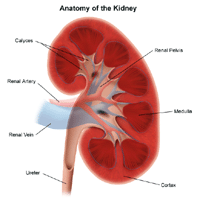A
B
C
D
E
F
G
H
I
J
K
L
M
N
O
P
Q
R
S
T
U
V
W
X
Y
Z
Click a letter to see a list of conditions beginning with that letter.
Click 'Topic Index' to return to the index for the current topic.
Click 'Library Index' to return to the listing of all topics.
Hemolytic Uremic Syndrome (HUS)
 |
| Click Image to Enlarge |
What is HUS?
Hemolytic uremic syndrome (HUS) is a rare condition that mainly affects children younger than 10 years old. It often causes:
What causes HUS?
Most cases of HUS occur after an infection in the digestive tract caused by a certain type of E. coli bacteria. Diarrhea and upper respiratory infections are the most common factors leading to HUS. This type of E. coli can be found in unpasteurized or raw milk, unwashed contaminated raw fruits and vegetables, contaminated juice, and undercooked meat. It is 1 of the causes of restaurant-related food poisoning outbreaks. HUS is less common in adults. But it may occur more often in women who:
How might HUS get worse?
The first stage of HUS often lasts from 1 to 15 days. It may include gastrointestinal symptoms, such as:
-
Belly pain
-
Bloody diarrhea
-
Fever and chills
-
Vomiting
-
Headache
Severe problems in the bowel and colon may develop in some cases. In these cases, even if the gastroenteritis has stopped, a child may still have these symptoms:
-
Irritability
-
Extreme tiredness (fatigue)
-
Small, unexplained bruises or small, clot-sized hemorrhages visible in the mucous lining of the mouth
-
Paleness
The child may make little urine. This is because damaged red blood cells and other factors may clog the tiny blood vessels in the kidneys or cause scars in the kidneys. This makes the kidneys work harder to remove wastes and extra fluid from the blood.
The body can't get rid of extra fluid and waste. This may cause:
The symptoms of HUS may look like other conditions or health problems. See your healthcare provider for diagnosis.
How is HUS treated?
No known treatment can stop the progress of the syndrome once it has started.
Most treatments are aimed at easing symptoms and preventing further complications. This may include:
-
Treating high blood pressure
-
Maintaining specific levels of fluids and salts
-
IV (intravenous) fluids and nutritional supplements with feeding tubes
-
Blood transfusions
-
Kidney dialysis
-
Medicine
What is the prognosis for HUS?
Most children with HUS recover fully. But a few will have lasting kidney damage.
Online Medical Reviewer:
Amy Finke RN BSN
Online Medical Reviewer:
Marc Greenstein MD
Online Medical Reviewer:
Raymond Kent Turley BSN MSN RN
Date Last Reviewed:
3/1/2023
© 2000-2025 The StayWell Company, LLC. All rights reserved. This information is not intended as a substitute for professional medical care. Always follow your healthcare professional's instructions.